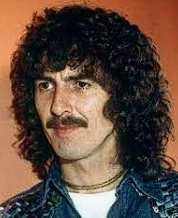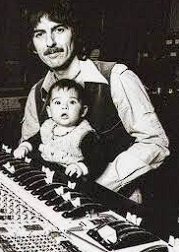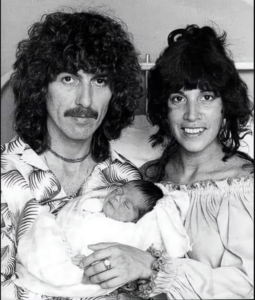Early Life and Musical Beginnings
Childhood in Liverpool
George Harrison was born on February 25, 1943, in Liverpool, England, to a working-class family. His father, Harold, was a bus conductor, and his mother, Louise, encouraged his early interest in music. Growing up in post-war Liverpool, Harrison found solace in music, often listening to the radio and learning to play the guitar at a young age.
Influence of Rock ‘n’ Roll
As a teenager, Harrison was captivated by the rising rock ‘n’ roll movement, idolizing artists like Chuck Berry, Buddy Holly, and Carl Perkins. His passion for the guitar led him to refine his skills, and by the late 1950s, he was playing in a local band. His big break came when he met Paul McCartney, who introduced him to John Lennon. Despite being younger than the other members, Harrison’s talent earned him a spot in their group, which would later become The Beatles.

The Beatles Years: Growth as a Musician
Joining the Fab Four
In 1960, The Beatles, with John Lennon, Paul McCartney, George Harrison, and later Ringo Starr, officially took shape. While Lennon and McCartney dominated the songwriting, Harrison contributed with his intricate guitar work and harmonies. His early compositions, though limited, showcased his emerging talent.
Rising as a Songwriter
As The Beatles evolved, so did Harrison’s role in the band. Though initially overshadowed by Lennon and McCartney’s songwriting dominance, he eventually made his mark with songs like “Taxman” (1966), “While My Guitar Gently Weeps” (1968), “Here Comes the Sun” (1969), and “Something” (1969). His music reflected deep emotions and an evolving spiritual awareness, setting him apart from his bandmates.

Spiritual Awakening and Indian Influence
Discovery of Indian Music
In 1965, Harrison was introduced to Indian classical music, particularly through the sitar, an instrument he famously played on “Norwegian Wood.” His fascination led him to study under renowned sitar maestro Ravi Shankar, influencing his compositions and introducing Eastern spirituality into Western pop music.
Embracing Hinduism and Meditation
Harrison’s spiritual journey went beyond music. He became deeply involved in Hinduism, meditation, and the teachings of the Hare Krishna movement. This spiritual awakening shaped his worldview, influencing his lyrics and personal philosophy. His quest for inner peace would become a defining aspect of his life and career.
Solo Career and Musical Independence
All Things Must Pass: A Triumphant Debut
Following The Beatles’ breakup in 1970, Harrison was the first member to release a successful solo album. All Things Must Pass, a triple album featuring songs like “My Sweet Lord” and “What Is Life,” showcased his songwriting prowess and emotional depth. It was both a commercial and critical triumph, cementing his place as a formidable solo artist.
The Concert for Bangladesh
Harrison’s humanitarian spirit shone in 1971 when he organized The Concert for Bangladesh, the first major charity concert. Featuring music legends like Bob Dylan, Eric Clapton, and Ravi Shankar, the event raised millions for refugees and set a precedent for future benefit concerts like Live Aid.

Later Years and The Traveling Wilburys
A New Musical Chapter
During the 1980s, Harrison balanced music with his personal passions, including gardening at his Friar Park estate. He also co-founded Handmade Films, a production company responsible for cult classics like Monty Python’s Life of Brian.
The Traveling Wilburys
In 1988, Harrison formed The Traveling Wilburys, a supergroup with Bob Dylan, Roy Orbison, Tom Petty, and Jeff Lynne. Their albums, Traveling Wilburys Vol. 1 (1988) and Vol. 3 (1990), were critically acclaimed, proving that Harrison’s creative spark remained strong.
Battle with Illness and Final Years
Fighting Cancer
In 1997, Harrison was diagnosed with throat cancer. Despite undergoing treatment, he continued to work on music and spend time with his family. His condition worsened in 2001 when he was diagnosed with lung cancer that had spread to his brain.
Passing and Legacy
On November 29, 2001, George Harrison passed away in Los Angeles at the age of 58. His ashes were scattered in the Ganges and Yamuna rivers in India, in accordance with his Hindu beliefs. His final album, Brainwashed, was released posthumously in 2002, featuring the poignant track “Stuck Inside a Cloud.”
Influence and Enduring Legacy
Musical Contributions
Harrison’s impact on music extended far beyond his time with The Beatles. His integration of Eastern sounds into Western rock, his deep and introspective lyrics, and his melodic guitar work influenced countless musicians across genres.
Spiritual and Humanitarian Impact
Beyond music, Harrison’s legacy lives on through his humanitarian efforts, spiritual teachings, and advocacy for peace. His influence continues to inspire generations of artists, thinkers, and seekers of truth.
Conclusion
George Harrison was much more than “The Quiet Beatle.” He was a visionary musician, a spiritual seeker, and a compassionate humanitarian. His contributions to music and society remain timeless, ensuring that his legacy will be cherished for generations to come.
